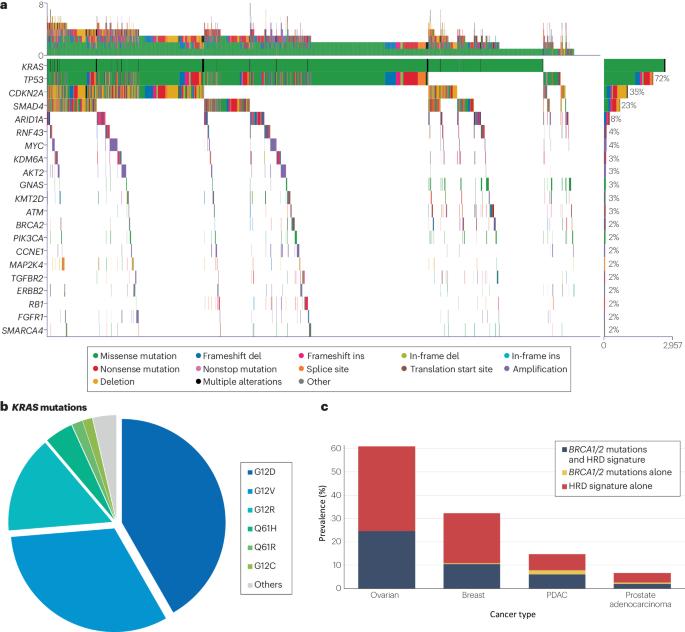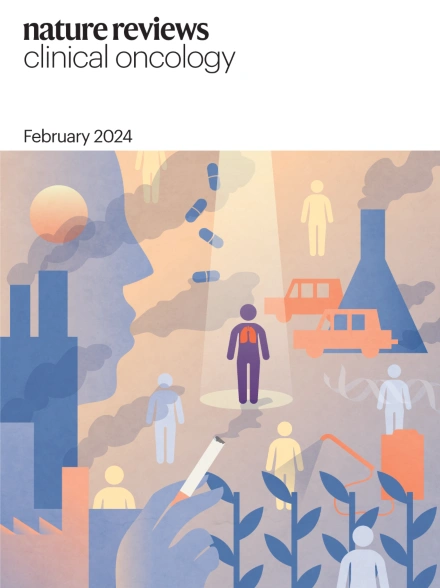改善胰腺癌患者的预后。
IF 82.2
1区 医学
Q1 ONCOLOGY
引用次数: 0
摘要
旨在改善胰腺导管腺癌(PDAC)患者预后的研究进展有限,在临床实践中,优化使用手术、化疗和支持性护理已导致生存期的适度改善,可能已达到平台期。因此,PDAC预计将在十年内成为西方社会癌症相关死亡的第二大原因。由于缺乏可操作的分子靶点,典型的免疫抑制微环境以及以快速进展和临床恶化为特征的病程,PDAC治疗进展的发展一直具有挑战性。然而,在过去几年中,我们对PDAC的理解和对新治疗机会的识别取得了进展,这使得该领域的乐观情绪高涨。从这个角度来看,我们解决了上述挑战,包括PDAC的生物学方面,使这种恶性肿瘤特别难以治疗。我们探索具有治疗进展潜力的特定领域,包括靶向突变KRAS,利用抗肿瘤免疫反应的新策略和早期检测方法,并提出改进临床试验设计的机制,克服各种社区和体制障碍。本文章由计算机程序翻译,如有差异,请以英文原文为准。

Improving outcomes of patients with pancreatic cancer
Research studies aimed at improving the outcomes of patients with pancreatic ductal adenocarcinoma (PDAC) have brought about limited progress, and in clinical practice, the optimized use of surgery, chemotherapy and supportive care have led to modest improvements in survival that have probably reached a plateau. As a result, PDAC is expected to be the second leading cause of cancer-related death in Western societies within a decade. The development of therapeutic advances in PDAC has been challenging owing to a lack of actionable molecular targets, a typically immunosuppressive microenvironment, and a disease course characterized by rapid progression and clinical deterioration. Yet, the progress in our understanding of PDAC and identification of novel therapeutic opportunities over the past few years is leading to a strong sense of optimism in the field. In this Perspective, we address the aforementioned challenges, including biological aspects of PDAC that make this malignancy particularly difficult to treat. We explore specific areas with potential for therapeutic advances, including targeting mutant KRAS, novel strategies to harness the antitumour immune response and approaches to early detection, and propose mechanisms to improve clinical trial design and to overcome various community and institutional barriers to progress. The incidence of pancreatic ductal adenocarcinoma (PDAC) has been increasing over the past few decades and survival rates for patients with this malignancy remain dismal. The authors of this Perspective discuss the challenges that have limited progress in the development of treatments for patients with PDAC and present novel approaches that could be leveraged to improve their outcomes.
求助全文
通过发布文献求助,成功后即可免费获取论文全文。
去求助
来源期刊
CiteScore
99.40
自引率
0.40%
发文量
114
审稿时长
6-12 weeks
期刊介绍:
Nature Reviews publishes clinical content authored by internationally renowned clinical academics and researchers, catering to readers in the medical sciences at postgraduate levels and beyond. Although targeted at practicing doctors, researchers, and academics within specific specialties, the aim is to ensure accessibility for readers across various medical disciplines. The journal features in-depth Reviews offering authoritative and current information, contextualizing topics within the history and development of a field. Perspectives, News & Views articles, and the Research Highlights section provide topical discussions, opinions, and filtered primary research from diverse medical journals.

 求助内容:
求助内容: 应助结果提醒方式:
应助结果提醒方式:


